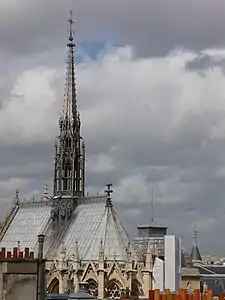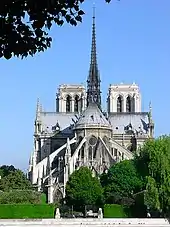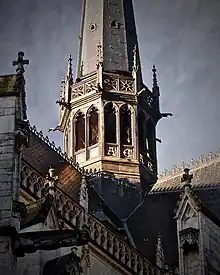

_%D0%B7%D0%B0%D0%BC%D0%BE%D0%BA%252C_%D0%91%D0%B0%D1%88%D0%BD%D1%8F_%D1%86%D0%B5%D1%80%D0%BA%D0%B2%D0%B8.jpg.webp)

A flèche (French: [flɛʃ]; French for 'arrow')[3] is the name given to spires in Gothic architecture. In French, the word is applied to any spire, but in English it has the technical meaning of a spirelet or spike on the rooftop of a building.[4][5] In particular, the spirelets often built atop the crossings of major churches in mediaeval French Gothic architecture are called flèches.[5]
On the ridge of the roof on top of the crossing (the intersection of the nave and the transepts) of a church, flèches were typically light, delicate, timber-framed constructions with a metallic sheath of lead or copper.[6] They are often richly decorated with architectural and sculptural embellishments: tracery, crockets, and miniature buttresses serve to adorn the flèche.[6]
Flèches are often very tall: the Gothic Revival spire of Notre-Dame de Paris (1858–2019) by Eugène Viollet-le-Duc was about 100 feet (30 m) before its destruction in the Notre-Dame de Paris fire, while the 16th century flèche of Amiens Cathedral is 148 feet (45 m) high.[6]
The highest flèche in the world was built at the end of the 19th century for Rouen Cathedral, 157 metres (515 ft) high in total.[7]
A short spire or flèche surrounded by a parapet is common on churches in Hertfordshire; as a result, this type of flèche is called a Hertfordshire spike.[8]

See also
Notes
- ↑ Curl, James Stevens; Wilson, Susan, eds. (2015), "Lassus, Jean-Baptiste-Antoine", A Dictionary of Architecture and Landscape Architecture (3rd ed.), Oxford University Press, doi:10.1093/acref/9780199674985.001.0001, ISBN 978-0-19-967498-5, retrieved 2020-05-27
- ↑ Curl, James Stevens; Wilson, Susan, eds. (2015), "Bazhenov, Vasily Ivanovich", A Dictionary of Architecture and Landscape Architecture (3rd ed.), Oxford University Press, doi:10.1093/acref/9780199674985.001.0001, ISBN 978-0-19-967498-5, retrieved 2020-05-27
- ↑ "spirelet". CollinsDictionary.com. HarperCollins. Retrieved 2020-05-21.
- ↑ Curl, James Stevens; Wilson, Susan, eds. (2015). "spire". A Dictionary of Architecture and Landscape Architecture (3rd ed.). Oxford University Press. doi:10.1093/acref/9780199674985.001.0001. ISBN 978-0-19-967498-5. Retrieved 2020-05-27.
- 1 2 Curl, James Stevens; Wilson, Susan, eds. (2015), "flèche", A Dictionary of Architecture and Landscape Architecture (3rd ed.), Oxford University Press, doi:10.1093/acref/9780199674985.001.0001, ISBN 978-0-19-967498-5, retrieved 2020-05-27
- 1 2 3 "Flèche | architecture". Britannica. Retrieved 2017-12-14.
- ↑ Causarano, Marie Ange (2009-12-30). "La cattedrale e la città: il cantiere del Duomo di Siena. Risultati delle indagini archeologiche". Arqueología de la Arquitectura (6): 199–224. doi:10.3989/arqarqt.2009.09013. ISSN 1989-5313.
- ↑ Curl, James Stevens; Wilson, Susan, eds. (2015), "Hertfordshire spike", A Dictionary of Architecture and Landscape Architecture (3rd ed.), Oxford University Press, doi:10.1093/acref/9780199674985.001.0001, ISBN 978-0-19-967498-5, retrieved 2020-05-27